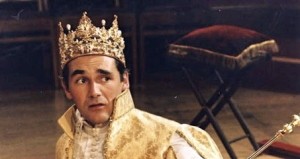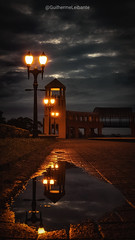The first of the 8 plays upon which ‘The Wars of the Roses’ event will be based is Shakespeare’s ‘Richard II’. The play was written in about 1595, and the first recorded performance was on 9 December that year. It has been suggested that it may not have been a stand-alone work. The guilt and controversy surrounding Richard’s deposition and death – seen by many as the corrupt and sinful betrayal of “God’s substitute, His deputy anointed in His sight” (‘Richard II’ – I.ii) – haunts the following history plays: ‘Henry IV’ parts One and Two, and indeed right up to the ‘Henry VI’ trilogy. So how does the deposition link in with the wars of the roses themselves in Shakespeare’s plays? To put it briefly, the rise of the House of Lancaster began when Henry Bolingbroke (later Henry IV) took the throne from Richard II; the House of York later challenged this and condemned Henry IV as a usurper. Richard, Duke of York, asserted his right to the throne as the rightful heir of Richard II and denounced Henry VI’s line… and the rivalry that had existed since the overthrowing of Richard II became bitterly violent.
In ‘Richard II’, themes of artifice, and the theatricality of royalty, are emphasised by the language. Shakespeare, rather unusually, uses very regular iambic pentameter and a lot of rhyming couplets (he is normally pretty sparing in his use of couplets, using them for particular emphasis, for example at the close of a scene).
However, in this famous speech – perhaps the most well-known in the play – we find that King Richard is not speaking in couplets, as he does in the court scenes, where he has perfected a performance. Having been subdued by news of Bolingbroke’s success with the people, Richard expresses his very real despair. His mask is stripped away: he verbally discards pomp and ceremony, finding himself but a mortal man. No theatrics, no show, and no pretence.
For God’s sake, let us sit upon the ground
And tell sad stories of the death of kings;
How some have been deposed; some slain in war,
Some haunted by the ghosts they have deposed;
Some poison’d by their wives: some sleeping kill’d;
All murder’d: for within the hollow crown
That rounds the mortal temples of a king
Keeps Death his court and there the antic sits,
Scoffing his state and grinning at his pomp,
Allowing him a breath, a little scene,
To monarchize, be fear’d and kill with looks,
Infusing him with self and vain conceit,
As if this flesh which walls about our life,
Were brass impregnable, and humour’d thus
Comes at the last and with a little pin
Bores through his castle wall, and farewell king!
Cover your heads and mock not flesh and blood
With solemn reverence: throw away respect,
Tradition, form and ceremonious duty,
For you have but mistook me all this while:
I live with bread like you, feel want,
Taste grief, need friends: subjected thus,
How can you say to me, I am a king?
(‘Richard II’: III.ii)
Right: Mark Rylance as Richard at Shakespeare’s Globe in London.
(Image Copyright 2011 Illuminations Media).











